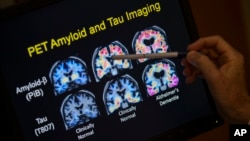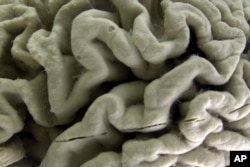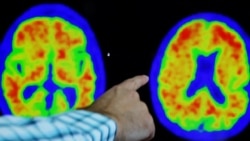New blood tests could help to identify, or diagnose, Alzheimer’s disease faster and with more accuracy, researchers reported recently. However, some of the tests for the brain-wasting disease appear to work better than others.
New tests, new drugs
Doctors can confirm Alzheimer’s in a patient if they find one of the disease’s main signs: the development, or buildup, of a sticky protein called beta-amyloid. Currently, doctors use brain imaging or a special test known as a spinal tap to look for beta-amyloid buildup. Brain imaging is hard to get and spinal taps are painful.
Instead, many patients are diagnosed based on their behavior and cognitive exams.
Now, labs have begun offering blood tests that can show some signs of Alzheimer’s. Scientists are excited about the possibilities that the tests offer.
But the tests are not widely used yet because there is little data to guide doctors about which kind to order and when. The U.S. Food and Drug Administration (FDA) has not officially approved any of them, and few patients have insurance coverage for such tests.
“What tests can we trust?” asked Dr. Suzanne Schindler of Washington University in St. Louis. Schindler is part of a research project examining the tests. While some tests are very accurate, Schindler said, “other tests are not much better than a flip of a coin.”
More than 6 million people in the United States and millions more around the world have Alzheimer’s, the most common form of dementia. Its usual signs, or “biomarkers,” are amyloid plaques and abnormal tau protein that leads to tangles that damage neurons.
New drugs such as Leqembi and Kisunla can slow the disease a little. The medicines remove amyloid from the brain. But these drugs only work in the early part, or stage, of Alzheimer’s progression. Few patients get the costly brain scans and invasive spinal taps that could show early stage Alzheimer’s.
Even specialists struggle to tell if Alzheimer’s or something else is to blame for a patient’s problems.
Schindler said she sometimes has patients “who I am convinced have Alzheimer’s disease and I do testing and it’s negative.”
A limited number of doctors have carried out blood tests for Alzheimer’s in carefully controlled research settings. However, a new study of about 1,200 patients in Sweden shows they also can work in doctors’ offices.
The findings suggest the blood tests may be more helpful for general care doctors. They see many more cases of people with memory problems than specialists do. However, general care doctors have fewer diagnostic tools.
In the study, patients who visited either a general care doctor or a specialist for memory problems got an early diagnosis using traditional exams. They gave blood for testing and got confirmatory spinal taps or brain scans.
Blood testing is far more accurate, Lund University researchers reported recently at the Alzheimer’s Association International Conference in Philadelphia. They said that the primary care doctors’ first diagnosis was 61 percent accurate and the specialists’ first diagnosis 73 percent. However, the blood test was 91 percent accurate, their study showed. The Journal of the American Medical Association published the study.
Different biomarkers
Dr. John Hsiao of the National Institute on Aging said the new tests measure different biomarkers in different ways.
Doctors and researchers should only use blood tests proven to have a greater than 90 percent accuracy rate, said Alzheimer’s Association chief science officer Maria Carrillo.
Carrillo and Hsiao agreed that the blood tests most likely to provide that accuracy measure what is called p-tau217. Schindler helped lead an unusual direct comparison of several kinds of blood tests that came to the same finding. The Foundation for the National Institutes of Health financed the work.
That kind of test measures a form of tau that correlates with how much plaque buildup someone has, Schindler explained. A high level signals a strong likelihood the person has Alzheimer’s. A low level strongly suggests Alzheimer’s is not the cause of a patient’s thinking problems.
Several companies are developing p-tau217 tests.
Who should use blood tests for Alzheimer’s?
In the United States, only doctors can order the blood tests from labs. The Alzheimer’s Association is working on policy suggestions and several companies plan to seek FDA approval, which would clarify correct use.
For now, Carrillo said doctors should use blood testing only in people with memory problems, after checking the accuracy of the kind they order.
Especially for primary care physicians, “it really has great potential to help them in sorting out who to give a reassuring message and who to send on to memory specialists,” said Dr. Sebastian Palmqvist of Lund University. Palmqvist led the Swedish study with Lund’s Dr. Oskar Hansson.
I’m John Russell.
And I’m Caty Weaver.
Lauran Neergaard reported on this story for the Associated Press. John Russell adapted it for VOA Learning English.
_____________________________________________
Words in This Story
diagnose – v. to identify a disease from its signs and symptoms
diagnosis – n. the act of identifying a disease from its signs and symptoms
accuracy – n. the quality of being precise or correct
cognitive – adj. of or relating to thinking, reasoning, or remembering
neuron – n. a cell that is the fundamental functional unit of nervous tissue transmitting and receiving nerve impulses
correlate – v. to bear mutual relations












Forum